

- Press Center

The Third Round Table Conference of Global Science Park Leaders is Held and the Participants Discuss Actively on Internet+ Innovative Development of ParksPrint
Post Time:2015-09-20来源:TusHoldings
On September 21, before the opening of the 32nd World Conference of International Association of Science Parks and Areas of Innovation (IASP) in Beijing, several representatives of IASP and leaders of international and domestic science parks visited TusPark and participated in the Third Round Table Conference of Global Science Park Leaders to warm up for the grand meeting of top science parks in the world in 2015.
As a global front-edge forum aiming to promote innovative development, and an annual forum of the highest grade in the field of international science parks in China, the Round Table Conference of Global Science Park Leaders was held annually since 2013, and was organized by Tus-Holdings Co., Ltd. This session of the Round Table Conference was greatly supported by IASP, the Management Committee of Zhongguancun Science Park and the Management Committee of Haidian Section of Zhongguancun Science Park, and was undertaken by Tus-Media.
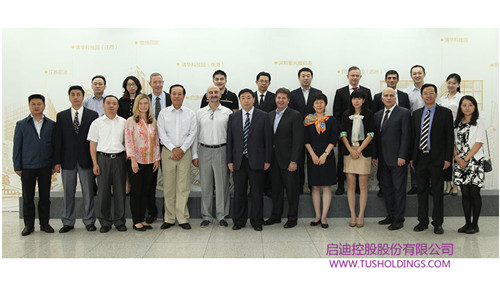
This forum is themed by “innovation and entrepreneurship, global development, science and technology services, cooperation”. At the forum, the domestic representatives, including Yang Yuecheng (deputy director of Torch Center of Ministry of Science and Technology), Liu Zhichun (deputy director of Industrial Development Section, New Hi-tech Department, Ministry of Science and Technology), Wang Rufang (deputy director of the Management Committee of Zhongguancun Science Park), Li Changping (executive deputy director of the Management Committee of Haidian Section of Zhongguancun Science Park), Hou Jin (deputy director of the Management Committee of Shanghai Zhangjiang Hi-tech Development Area), Chen Minggang (board chairman of Shenzhen Merchant Industry Development Co., Ltd.), Liu Kefeng (general manager of Zhongguancun Software Park), Lan Ningyu (sponsor of AngelCrunch), and so on, made deep communication with international guests such as Luis Sanz (director general of IASP), Josep Piqué (vice chairman of IASP and CEO of Vigor Barcelona Company), Jari Lauronen (chairman of European Division of IASP and director and general manager of Joensuun Science Park in Finland), Movsesian Oleg Vladimirovich (CEO of Moscow State University Science Park), Lena Miranda (CEO of Mjärdevi Science Park AB), Paul Krutko (president and CEO of Ann Arbor Science Park in USA), Björn Westling (SME Relation Director of Johnsbury Science Park in USA), and so on.
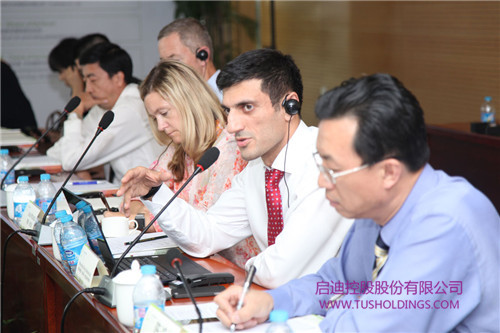
As co-chairman, Mei Meng (director of TusPark Development Center and board chairman of TusHoldings) and Chen Hongbo (executive vice president of TusHoldings, director of IASP and chairman of Asia-Pacific Division of IASP) organized the discussions of the participants of the Conference. Wang Jiwu (president of TusHoldings) gave a themed speech with the title of “TusHoldings’ global innovation strategy”, Du Peng (deputy director of the Management Committee of TusPark) chaired the meeting, and An Hongping (senior vice president of TusHoldings and board chairman of TusPark Operation Management Co., Ltd.) shared his opinions with other participants.
What will “Internet+” bring?
What change has “Internet+” brought on earth?With respect to technological development, “Internet+” has not only caused great impact on products, infrastructures and spatial layout but also changed interpersonal information communication and the way of decision making. For science parks, “Internet+” has caused greater overturn to resource gathering mode, to incubation and investment mode, and to the whole business and operation mode.
Wang Rufang, deputy director of the Management Committee of Zhongguancun Science Park, expressed that: the essence of Science Park was integration and innovation, and such integration and innovation had greater significance in the age of “Internet+”. “As Internet has greatly changed our boundaries and transaction costs, the concept of the traditional scale economy is overturned. ‘Internet+’ provides wings for flying of science parks. Internet plus science and technology services and Internet plus hi-tech industries form better innovation eco-system of science parks. There may a tendency of changing from the consumptive Internet in the past gradually to combined development of consumptive Internet and industrial Internet, and a batch of platform companies and vertical professional park service companies will appear due to such change.”
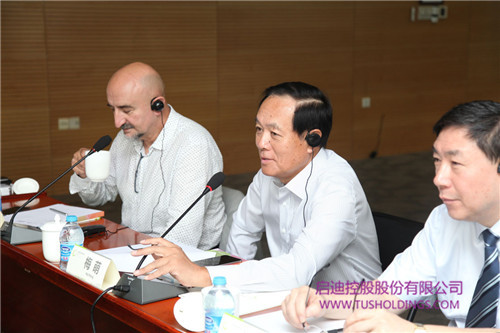
Mei Meng, director of TusPark Development Center and board chairman of TusHoldings, happened to have the same view, and brought forward a recapitulative concept of “Park +”: “While we are talking about Internet+ science park, I think we can change it to ‘Park +’ through Internet. There will be professional operators to operate, run and manage science parks in future, and this brings higher requirements and standards for service providers. There may be a batch of science park service providers, and the park run by the service providers is ‘Park +’. Then, the science park will have its own products, brand, scale, network and finally standards.”
“With respect to development mode or business mode of science park, science park developers have changed from single-function developer to park developer + park service provider + innovation and entrepreneurship investor, with ‘three-in-one’ functions,” said by Hou Jin (deputy director of the Management Committee of Shanghai Zhangjiang Hi-tech Development Area). In his opinion, there may be no problem in such “three-in-one” function in overseas countries, as the science parks there are not as large as those in China, but this may become an unavoidable problem for science parks in China. “Some representatives mentioned equity investment just now. In terms of business mode, real estate lease can bring a stable return to the park, but without high growth. On the contrary, equity investment into innovative and startup enterprises will bring high risk and high return. The park operation enterprise may have sound development if it can maintain a good ratio between such returns. In the past, the development mode of Science Park in China was basically based on the park developer’s income from land and real estate rental. In future, the development mode may change gradually toward the ‘three-in-one’ mode.”
The most intuitionistic evidence of such change is that the original name of IASP, i.e. International Association of Science Parks, was changed to International Association of Science Parks and Areas of Innovation. In the opinions of Chen Hongbo (executive vice president of TusHoldings, director of IASP and chairman of Asia-Pacific Division of IASP), such change was just derived from the views of the last Round Table Conference of Global Science Park Leaders. He said: “Last year was the 20th anniversary of establishment of TusPark, and the participants of the conference brought forward very good suggestions on the development of science parks in the next 20 years. For example, the boundary of hi-tech park will become increasingly unclear, hi-tech parks will become more and more open and integrated, and the areas and cities where the science parks are located will become more and more international. This is why IASP changed its name.”
What should science parks do in the age of “Internet+”?
Then, what should science parks do on earth in the age of “Internet+”?
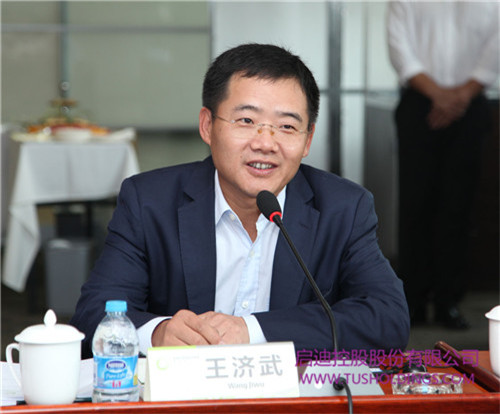
The several trends mentioned in President Wang’s speech are worthy of consideration. “The first trend is the trend toward cluster type development in the field of global science park construction along with the utilization of big data and development of cloud technology. First of all, we are aggregates, and various elements are aggregated in Science Park. Then, we are groups consisting of many base groups. TusHoldings has built nearly 100 bases in the world, which include over 20 large-scale science cities, over 20 middle-sized science parks, and 60-70 small bases, that are incubators and mass-innovation spaces represented by TusStar. The mutual promotion effect among these bases is very obvious.”
“The second trend is that the current science and technology service industry, especially science parks, has transformed from attracting settlement of scientific research institutes and enterprises in the early period to directly controlling and influencing a big batch of leading hi-tech enterprises. In last year, we brought forward a strategy of ‘driving small ones by big ones’. In other words, TusHoldings should hold controlling interests in a batch of listed companies. So far we have controlled four listed companies, and we are leading in some industries. Thus, we can enrich our parks with our own enterprises, and promote the development of a big batch of SMEs by virtue of our own large-scale listed companies. ”
“The third trend is that the science parks are becoming more and more important in area functions of each city, and Science Park itself has a tendency of differentiation. Taking Beijing for example, the economic center of Beijing was financial street or CBD in the past, but now it is no doubt that the new center of this city is Zhongguancun. In future, each city in China will have such a tendency. Science Park will become the most important economic area of each city, and the most important enterprises will be born in such area. Meanwhile, Science Park will be no longer an isolated park, but be integrated into a city or city cluster. At this time, science parks will be differentiated, becoming either larger or smaller.”
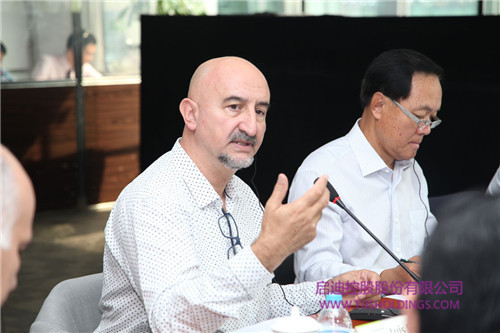
Among the international guests participating in the conference, Luis Sanz, director general of IASP, has visited China and communicated with TusPark and other science parks in China for many times. In his opinion, China has very good development environment and also great change. In the age of “Internet+”, he wishes this country such a huge economic volume can embrace the world with a more attitude. Meanwhile, he expressed great interest in the new mode of “incubation + investment” mentioned by the Chinese representatives, and expected that western science parks could learn from the experiences of the science parks in China.
“The views brought forward at each session of this Conference are summary of the practical experience of experts and managers who have worked in the field of science park and incubator for many years,” said by Chen Hongbo. He also expressed that TusHoldings and TusPark would gather and summarize all the important views through this important platform (the Conference), and provide valuable guiding suggestions for the future development of science parks in China.















